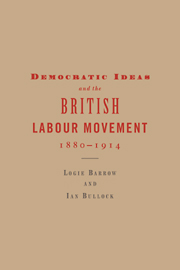Conclusions
Published online by Cambridge University Press: 09 November 2009
Summary
At the broadest level, there were two views of democracy competing with each other in the socialist and trade union movements in Britain. These two views can be distinguished, most simply, as the ‘strong’ and the ‘weak’.
The strong view established itself in the 1880s when socialist organisations and their direct influence were both very small. Consciously descended from a long British and European tradition of plebeian radical democracy, this strong version took the notions of the sovereignty of the people, political equality and self-government literally. Aspirations extended beyond universal suffrage and representative government to ensuring the power of electors over elected and the most direct participation possible by the citizen in decision-making: what was sometimes described as ‘popular government’. Great emphasis was placed on the need for socialists to prepare and stimulate popular participation through ‘education’ and ‘agitation’.
The proponents of such views recognised many obstacles. Those with power encouraged apathy and the related disease of ‘Leadermania’. T. H. Hunt, writing in Justice in 1897, believed that ‘Leadermania has now arrived at the stage when, if it is not utterly to subvert the power of democratic thought must be checked through … a drastic antidote’. Such a remedy was hard to find, though socialist organisations, it was believed, might begin doing so by means of their own practice. Their standards of internal democracy were expected to prefigure those looked for in the future ‘socialist Commonwealth’.
Any perceived failure was severely criticised and could lead to long and acrimonious internal dissension.
- Type
- Chapter
- Information
- Democratic Ideas and the British Labour Movement, 1880–1914 , pp. 290 - 304Publisher: Cambridge University PressPrint publication year: 1996



